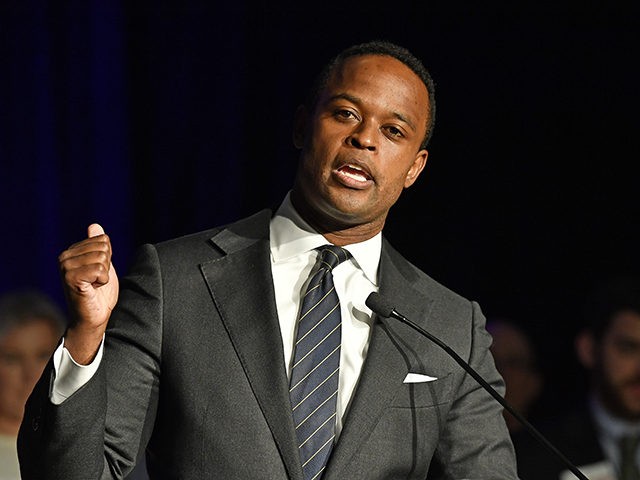Kentucky Attorney General Daniel Cameron (R) is leading 17 states in the filing of an amicus brief before the U.S. Supreme Court in support of an Indiana law that requires parents to be informed when their child is granted court approval for an abortion without their consent.
WDRB reported Cameron argues in the brief for Box v. Planned Parenthood of Indiana and Kentucky that states have an interest in protecting minors who are considering having an abortion.
As Breitbart News reported on January 2, Indiana Attorney General Curtis Hill (R) asked the U.S. Supreme Court to uphold a measure signed into law in 2017, but never enacted, that requires parents to be notified when a minor who is granted court approval for an abortion, is about to have the procedure.
“Nothing in the U.S. Constitution prohibits Indiana from requiring parental notification when an unemancipated minor is getting an abortion,” Hill said in a press statement. “Even to get a tattoo, a minor in Indiana needs parental permission. Quite simply, parents have rights and responsibilities in the care and upbringing of a child.”
The law specifically pertains to minors who have already received an exemption from a juvenile court allowing them to have an abortion without parental permission. Under the law, parental notice would still be required, except when the court indicates the child lives with abusive family members or some other reason that would be against the best interests of the child.
“An abortion is a medical procedure that could have implications for a child’s future treatment,” Hill said. “It’s an event that could bear on a child’s emotional needs and mental health, and it’s an event that parents need to know about in order to provide nurturing care and guidance.”
The ACLU, however, challenged the law on behalf of Planned Parenthood shortly after it passed and just before it was about to be enacted.
ACLU attorney Ken Falk argued the law “would impose an undue burden on the recognized constitutional right of young women to obtain an abortion.”
A preliminary injunction against the enforcement of the law by a three-judge panel of the Seventh Circuit U.S. Court of Appeals is still in place and the court declined the state’s petition for a rehearing of the matter by the full court.
“It is better to send this dispute on its way to the only institution that can give an authoritative answer,” wrote Judge Frank Easterbrook of the Seventh Circuit, an appointee of President Ronald Reagan.
Citing the issue of a “tangled web of case law,” Hill said, “When even the most experienced and distinguished members of the federal judiciary throw up their hands in confused frustration, it is time for our nation’s highest court to issue guidance.”
Cameron has been leading and joining other amicus briefs in support of pro-life legislation since he was sworn in as Kentucky’s top law enforcement official.
On January 23, Cameron’s office announced the attorney general would be joining Indiana and 16 other states in an amicus brief that asks the U.S. Sixth Circuit Court of Appeals to uphold an Ohio law banning abortions sought because of a pre-natal diagnosis of Down syndrome. The entire Sixth Circuit agreed to rehear the case after a three-judge panel threw out Ohio’s law.
“Every life has value, and we cannot allow abortion to pre-determine the characteristics of an entire generation,” Cameron said in a press statement. “The passage of HB 5 last year made it clear that Kentucky will not stand for discriminatory abortions, and we have a duty to assist other states in their defense of similar laws.”
Also this month, Cameron led 17 states in filing an amicus brief before the U.S. Supreme Court that supports Indiana in another abortion-related case.
The U.S. Court of Appeals for the Seventh Circuit ordered Indiana to issue a license to abortion provider Whole Woman’s Health Alliance, after the state initially denied the license.
Cameron’s brief stresses that only states can issue licenses to abortion providers, not federal courts.
Cameron said in a press statement:
States should not be forced by the federal courts to issue state licenses. The Seventh Circuit’s decision endangers our system of federalism and sets a precedent that threatens the sovereignty of states and the safety and well-being of citizens. While our federal courts may determine if the process used by a state to issue or deny a license is constitutional, we do not believe they can order a state agency to license an abortion clinic.
Cameron also joined 20 states in an amicus brief before the Supreme Court in June Medical Services, LLC v. Gee, a case that centers on a Louisiana law that requires abortionists to have admitting privileges at nearby hospitals in the event of an emergency or complication that arises from the abortion.
The Supreme Court will hear that case in March.
“We cannot allow the self-interested motives of abortion providers and facilities to dictate the circumstances under which abortion procedures are performed,” said Cameron in a statement. “If Louisiana’s commonsense law is overturned, it will set a dangerous precedent that allows the very industry that profits from abortions to now regulate abortions and determine what is safe for pregnant women.”
Cameron has served as legal counsel to Senate Majority Leader Mitch McConnell (R-KY) by directing the confirmation process for conservative federal judges, including current Supreme Court Justice Neil Gorsuch.
In November, Cameron received the endorsement of President Donald Trump.
“A star is born,” Trump said when Cameron appeared with him at a rally in Kentucky just prior to Election Day.

COMMENTS
Please let us know if you're having issues with commenting.